It looks like you're using an Ad Blocker.
Please white-list or disable AboveTopSecret.com in your ad-blocking tool.
Thank you.
Some features of ATS will be disabled while you continue to use an ad-blocker.
share:
reply to post by VeritasAequitas
I can agree with you there.
If you would like to read up on this from a very interesting point of view I recommend reading "The book of Illumination" by aqualeo.
It contains information on the 4 major religions, kabbalah, astrology, just full of good information also mentioning masonry, gods and their relation to today.
I can agree with you there.
If you would like to read up on this from a very interesting point of view I recommend reading "The book of Illumination" by aqualeo.
It contains information on the 4 major religions, kabbalah, astrology, just full of good information also mentioning masonry, gods and their relation to today.
reply to post by VeritasAequitas
I don't have access to a computer at the moment and I am typing this from my phone which is just dreadful typing on but I'll post some links
tomorrow of some books and essays on the topic. Hopefully, if I have time I'll finish my thoughts from my earlier post.
reply to post by VeritasAequitas
I am convinced that the culture the Sir Arthur Evans called the Minoan civilization was the basis of the myth of Atlantis as described by Plato
in Critias and Timaeus. Apart from problems with the date Plato stated for Atlantis, other details fit very nicely. Plato's dating or really Solon's
dating as reported by Plato is highly suspect as there is zero evidence to support such an early date.
Critias by Plato
A few examples.
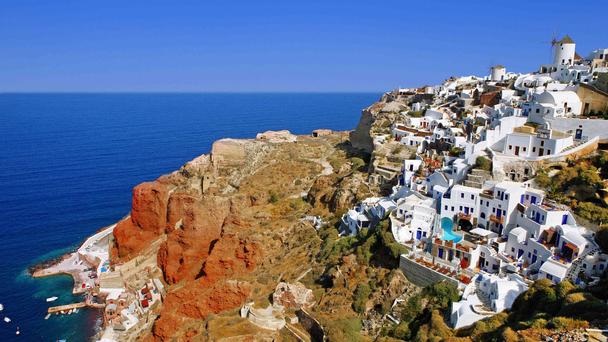
Black, red and white stone does exist on Akrotiri (Santorini)
"There were bulls who had the range of the temple of Poseidon,"
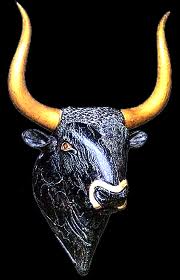
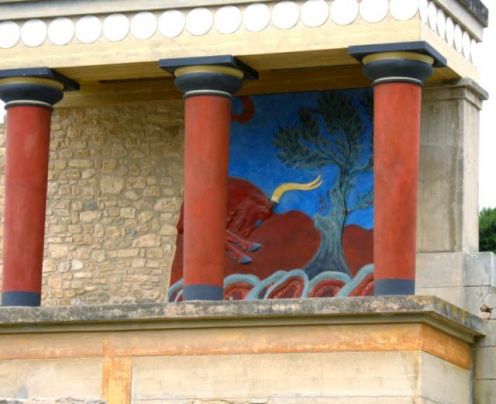
The Palace of Knossos in Crete
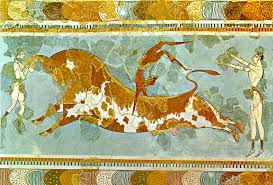
Bull leapers fresco from the Palace of Knossos
"and the ten kings, being left alone in the temple, after they had offered prayers to the god that they might capture the victim which was acceptable to him, hunted the bulls, without weapons but with staves and nooses; and the bull which they caught they led up to the pillar and cut its throat over the top of it so that the blood fell upon the sacred inscription."
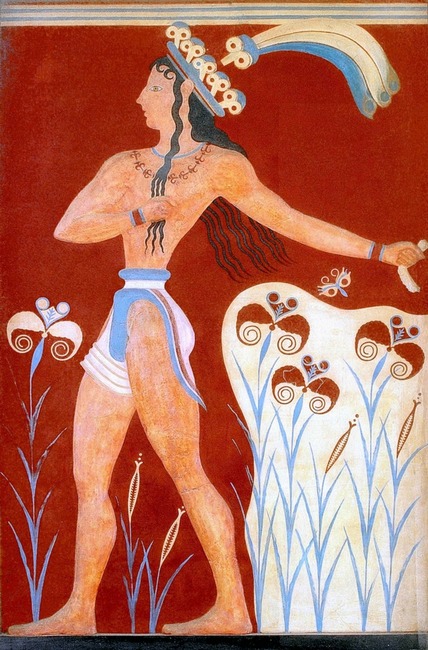
Priest-king leading an animal to sacrifice (possibly a bull if we can judge by the dominant motif at Knossos but the fresco is incomplete.
"there were a great number of elephants in the island"
Notice that Plato was using past tense describing Elephants in Atlantis.
Cave of Elephants
"orichalcum, was dug out of the earth in many parts of the island, being more precious in those days than anything except gold"
Orichalcum is that to be an alloy of copper, possibly bronze or brass.
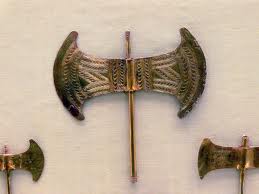
"All these and their descendants for many generations were the inhabitants and rulers of divers islands in the open sea; and also, as has been already said, they held sway in our direction over the country within the Pillars as far as Egypt and Tyrrhenia."
Minoans and Phoenicians
Minoan Trading
A video of the Palace of Knossos for those who only like to see videos and aren't fond of reading
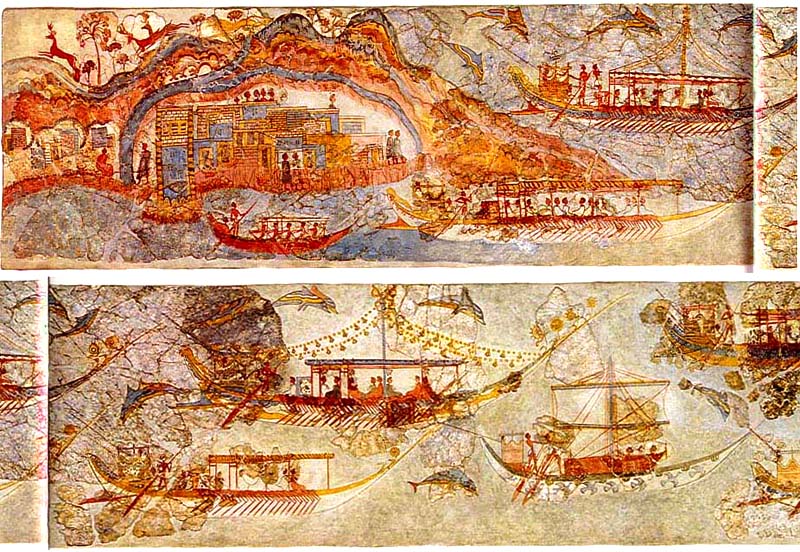
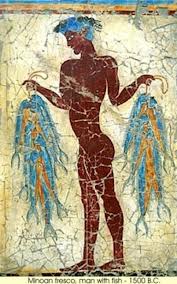
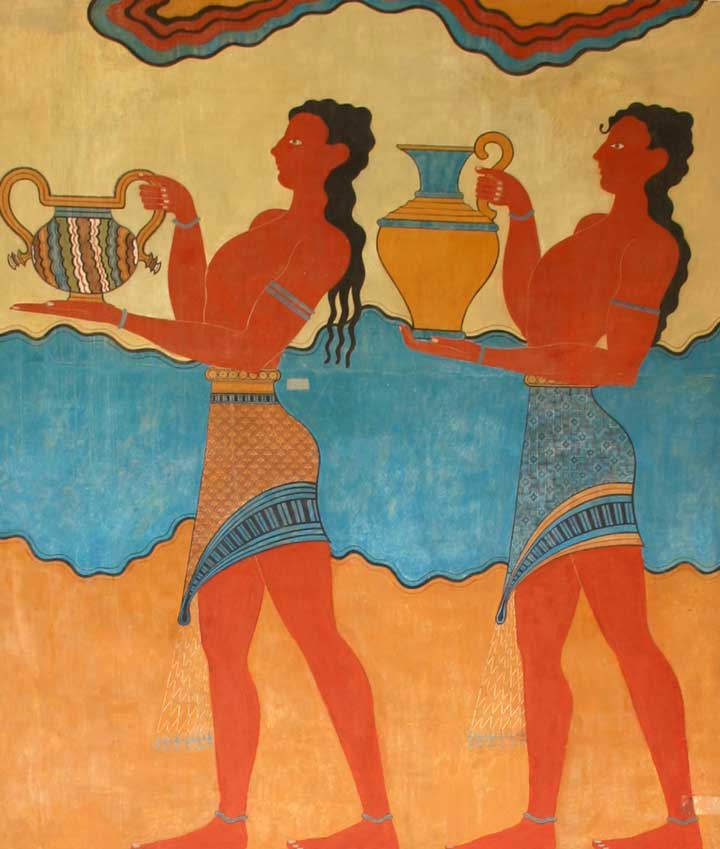
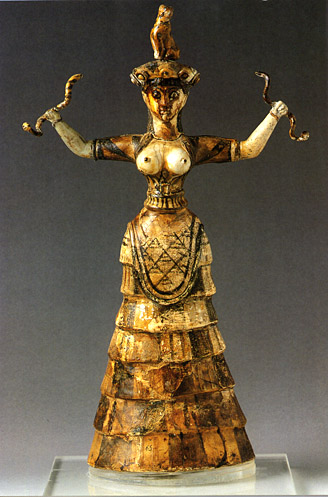
Ancient Crete
Atlantis or Minoan Crete
Critias by Plato
A few examples.
"The stone which was used in the work they quarried from underneath the centre island, and from underneath the zones, on the outer as well as the inner side. One kind was white, another black, and a third red."

Black, red and white stone does exist on Akrotiri (Santorini)
"There were bulls who had the range of the temple of Poseidon,"


The Palace of Knossos in Crete

Bull leapers fresco from the Palace of Knossos
"and the ten kings, being left alone in the temple, after they had offered prayers to the god that they might capture the victim which was acceptable to him, hunted the bulls, without weapons but with staves and nooses; and the bull which they caught they led up to the pillar and cut its throat over the top of it so that the blood fell upon the sacred inscription."

Priest-king leading an animal to sacrifice (possibly a bull if we can judge by the dominant motif at Knossos but the fresco is incomplete.
"there were a great number of elephants in the island"
Notice that Plato was using past tense describing Elephants in Atlantis.
Cave of Elephants
"orichalcum, was dug out of the earth in many parts of the island, being more precious in those days than anything except gold"
Orichalcum is that to be an alloy of copper, possibly bronze or brass.

"All these and their descendants for many generations were the inhabitants and rulers of divers islands in the open sea; and also, as has been already said, they held sway in our direction over the country within the Pillars as far as Egypt and Tyrrhenia."
Minoans and Phoenicians
Minoan Trading
A video of the Palace of Knossos for those who only like to see videos and aren't fond of reading




Ancient Crete
Atlantis or Minoan Crete
edit on 1-8-2013 by no1smootha because: (no reason given)
reply to post by no1smootha
I always have problems with Plato thinking the Minoan Culture were the Atlanteans because surely a man as educated as Plato would have know where the Minoan people lived and would have said Atlantis was on the Greek Islands and not past the Straits of ``Hercules - in the Atlantic Ocean. The guy travelled and would have known his geography.
In the UK our scholars on the tv are determined to make the island of Santorini Atlantis but just the name suggests the Atlantic Ocean.
I always have problems with Plato thinking the Minoan Culture were the Atlanteans because surely a man as educated as Plato would have know where the Minoan people lived and would have said Atlantis was on the Greek Islands and not past the Straits of ``Hercules - in the Atlantic Ocean. The guy travelled and would have known his geography.
In the UK our scholars on the tv are determined to make the island of Santorini Atlantis but just the name suggests the Atlantic Ocean.
Originally posted by no1smootha
I am convinced that the culture the Sir Arthur Evans called the Minoan civilization was the basis of the myth of Atlantis as described by Plato in Critias and Timaeus.
I agree and I suggest reading Charles Pellegrino's Unearthing Atlantis which details the excavations and revelations you have depicted above.
reply to post by Shiloh7
I believe that Plato either misunderstood or changed the account so as not to be recognized as the Minoan civilization perhaps because he was
using the story as a literary device to explain human and divine natures among other things. But as I see it, there are two significant problems with
Atlantis being 11,500 years ago and located in the Atlantic Ocean as he suggested. First, it was said that Athens and Egypt were the nations that went
to war with and defeated the Atlantians, but the problem with this is that Athenian and Egyptian civilization left us with many material remains none
of which indicate they were so ancient as 11,500 years old. Second, it was said that "when afterwards sunk by an earthquake, became an impassable
barrier of mud to voyagers sailing from hence to any part of the ocean", however when considering the depth of the Atlantic it would seem impossible
but not so with the Aegean.
edit on 1-8-2013 by no1smootha because: (no reason given)
Originally posted by no1smootha
But as I see it, there are two significant problems with Atlantis being 11,500 years ago and located in the Atlantic Ocean as he suggested.
The book I mentioned above has Egyptian accounts of a massive volcanic eruption emmanating in the vicinity of the Santorini island and details their decline which gives credence to the Minoans as Atlanteans theory.
reply to post by AugustusMasonicus
Yes I agree, and this was possibly the event the lead a domino effect of mass migrations that lasted for centuries and brought humanity to the
close of the Bronze age as it has been suggested that the eruption lead to AT LEAST one summer without sun.
Originally posted by no1smootha
Yes I agree, and this was possibly the event the lead a domino effect of mass migrations that lasted for centuries and brought humanity to the close of the Bronze age as it has been suggested that the eruption lead to AT LEAST one summer without sun.
If memory serves me the Egyptians recorded three poor crop-growing summers. Pellegrino also speculates that some aspects of the massive natural disaster could have led to the genesis of the Exodus plagues and misfortunes myths that befell the Egyptians.
Originally posted by no1smootha
Originally posted by VeritasAequitas
reply to post by no1smootha
Based on your reply here ;
www.abovetopsecret.com...
If Cain and Seth are really somehow the same person, then wouldn't that be exactly what happened? You are arguing that it wasn't Cain who did these things but Seth, however how does that not fit if they are one and the same?
No, that isn't my argument. I am arguing that there is only one lineage whether from Cain or Seth, and that Tubalcain is either Noah or a brother of Noah. I suspect that the reason there are two different progenitors is that two seperate narratives are shuffled together in Genesis.
The reason why Cain is not of the same line as Able or Seth is because his dad was not Adam, he was a demigod whilst Seth was just a man.
reply to post by no1smootha
You know that DNA analysis at several ancient Minoan burial sites has proven that they were a colony of Europeans: www.bbc.co.uk...
The Edfu text in Egypt talks of how Osiris sailed into Egypt after abandoning the island of conflict after a flood submerged it.
You know that DNA analysis at several ancient Minoan burial sites has proven that they were a colony of Europeans: www.bbc.co.uk...
The Edfu text in Egypt talks of how Osiris sailed into Egypt after abandoning the island of conflict after a flood submerged it.
reply to post by VeritasAequitas
Vedic culture is older then Hinduism, the Aryans were not Hindus (and not native to India originally) that came later. Celts are basically a vedic people too.
Vedic culture is older then Hinduism, the Aryans were not Hindus (and not native to India originally) that came later. Celts are basically a vedic people too.
1 John 3:10-12
King James Version (KJV)
10 In this the children of God are manifest, and the children of the devil: whosoever doeth not righteousness is not of God, neither he that loveth not his brother.
11 For this is the message that ye heard from the beginning, that we should love one another.
12 Not as Cain, who was of that wicked one, and slew his brother. And wherefore slew he him? Because his own works were evil, and his brother's righteous.
King James Version (KJV)
10 In this the children of God are manifest, and the children of the devil: whosoever doeth not righteousness is not of God, neither he that loveth not his brother.
11 For this is the message that ye heard from the beginning, that we should love one another.
12 Not as Cain, who was of that wicked one, and slew his brother. And wherefore slew he him? Because his own works were evil, and his brother's righteous.
reply to post by no1smootha
Suggest you look through the thread 'Extinction Event, what like last time? You will see the research that has gone on concerning Atlantic being where Plato said it was. We are only just discovering the history relating to the Americas which means that history is going to have to be rewritten. Even the DNA is giving fascinating information of the groups who reached America and travelled back and forwards and around the southern hemisphere far earlier than the Egyptians took to the water. Somewhere in there is a possible link to the Druids which sadly the Church did such a good job of 'disappearing' and had we have had more to go on, would have clarified a lot about history.
I don't see any reason for hiding the Minoan civilisation. One thing I did notice is that the pictures of the Minoans are painted at the same angle as the Egyptian ones with people standing sideways on. (Just an observation).
Suggest you look through the thread 'Extinction Event, what like last time? You will see the research that has gone on concerning Atlantic being where Plato said it was. We are only just discovering the history relating to the Americas which means that history is going to have to be rewritten. Even the DNA is giving fascinating information of the groups who reached America and travelled back and forwards and around the southern hemisphere far earlier than the Egyptians took to the water. Somewhere in there is a possible link to the Druids which sadly the Church did such a good job of 'disappearing' and had we have had more to go on, would have clarified a lot about history.
I don't see any reason for hiding the Minoan civilisation. One thing I did notice is that the pictures of the Minoans are painted at the same angle as the Egyptian ones with people standing sideways on. (Just an observation).
reply to post by no1smootha
Something we never question about the Cain and Able story is that were Cain in awe of God, he would never had dared to murder his brother, he would have been too scared of the retribution. So why did he go so far as murder the story makes little sense to me; everyone gets jealous at times but murder is a step too far when that close to God surely?
Something we never question about the Cain and Able story is that were Cain in awe of God, he would never had dared to murder his brother, he would have been too scared of the retribution. So why did he go so far as murder the story makes little sense to me; everyone gets jealous at times but murder is a step too far when that close to God surely?
Originally posted by Shiloh7
reply to post by no1smootha
Something we never question about the Cain and Able story is that were Cain in awe of God, he would never had dared to murder his brother, he would have been too scared of the retribution. So why did he go so far as murder the story makes little sense to me; everyone gets jealous at times but murder is a step too far when that close to God surely?
Another good question is why did the Lord prefer a blood sacrifice that able provided but was not pleased by fruits and grains from the fields that Cain offered...obviously he likes blood. Another good question is is this "God" even a God or is he an imposter playing God?
edit on 2-8-2013
by LUXUS because: (no reason given)
reply to post by LUXUS
I am aware that the Aryans were not Hindu's. From the research I have come to, the Aryans refer to the remnants of the lost civilization of Atlantis. I realize as well, Vedic culture is older than Hinduism, however a lot of their traits passed into the formation of Hinduism, which is based in good part on Vedic literature.
Vedic culture is older then Hinduism, the Aryans were not Hindus (and not native to India originally) that came late
I am aware that the Aryans were not Hindu's. From the research I have come to, the Aryans refer to the remnants of the lost civilization of Atlantis. I realize as well, Vedic culture is older than Hinduism, however a lot of their traits passed into the formation of Hinduism, which is based in good part on Vedic literature.
reply to post by Shiloh7
If you think about it what is being suggested here, that the Minoan culture was Atlantis, it is a rewrite of history based in part on Plato but more especially on the archaeological record.
Until the discoveries of the early 20th century most all scholars would have said Atlantis is nothing but a myth based upon a story told by Solon (a statesman and reformer in Athens), to the great grandfather of Critias, who told the grandfather of Critias who told young Critias when he was 10 years old the story of ancient Atlantis that is then being told to us through Plato. If you don't understand how errors could have crept in to this account, then I guess you and I are done discussing this possibility. You are free to believe as you will.
If you think about it what is being suggested here, that the Minoan culture was Atlantis, it is a rewrite of history based in part on Plato but more especially on the archaeological record.
Until the discoveries of the early 20th century most all scholars would have said Atlantis is nothing but a myth based upon a story told by Solon (a statesman and reformer in Athens), to the great grandfather of Critias, who told the grandfather of Critias who told young Critias when he was 10 years old the story of ancient Atlantis that is then being told to us through Plato. If you don't understand how errors could have crept in to this account, then I guess you and I are done discussing this possibility. You are free to believe as you will.
edit on 2-8-2013 by no1smootha
because: (no reason given)
reply to post by LUXUS
In my previous posts I have hinted at the tendency for syncretism in the ancient world. This is, I believe, one of the reasons for confusing
Biblical narratives. In fact, the name Seth may very well be an example of syncretism of a group of Asiatic foreign chiefs known as the Hyksos
(literally, "rulers of foreign lands") who ruled Lower Egypt ruling the Nile Delta from Avaris during the Second Intermediate Period. The
corresponds with Jacob becoming vizier for the Pharoah and his family sojourning in Egypt. During thier rule they chose Set; the god of foreigners,
the god of the desert, the god of storms and the god they found similarities their own chief god.
Set
The Hyksos would have controlled the Nile Delta and Egyptian ports around the same time the Phoenician and Minoan trade was at it's greatest extant and they likely rose to power and riches. Coincidently their reign in Lower Egypt would come to and end around the same time as the Thera explosion or immediately thereafter. The loss or disruption of the trade in tin for bronze especially would have severely weakened the leadership.
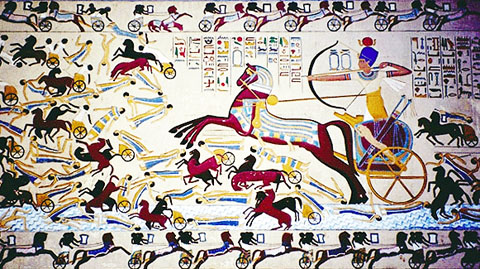
When Ahmose I overthrew the Hyksos and expelled them from Egypt, this might then represent the Exodus of the Bible. The people being lead to the Promised Land are told to avoid the Philistines who possibly settled in the area after the destruction of Thera and collapse of the Minoan civilization at Crete.
The Hyksos King Apophis is recorded as worshiping Set in a monolatric way: "[He] chose for his Lord the god Seth. He didn't worship any other deity in the whole land except Seth."
Set
The Hyksos would have controlled the Nile Delta and Egyptian ports around the same time the Phoenician and Minoan trade was at it's greatest extant and they likely rose to power and riches. Coincidently their reign in Lower Egypt would come to and end around the same time as the Thera explosion or immediately thereafter. The loss or disruption of the trade in tin for bronze especially would have severely weakened the leadership.

When Ahmose I overthrew the Hyksos and expelled them from Egypt, this might then represent the Exodus of the Bible. The people being lead to the Promised Land are told to avoid the Philistines who possibly settled in the area after the destruction of Thera and collapse of the Minoan civilization at Crete.
new topics
-
Supreme Court Oral Arguments 4.25.2024 - Are PRESIDENTS IMMUNE From Later Being Prosecuted.
Above Politics: 45 minutes ago -
Krystalnacht on today's most elite Universities?
Social Issues and Civil Unrest: 54 minutes ago -
Chris Christie Wishes Death Upon Trump and Ramaswamy
Politicians & People: 1 hours ago -
University of Texas Instantly Shuts Down Anti Israel Protests
Education and Media: 3 hours ago -
Any one suspicious of fever promotions events, major investor Goldman Sachs card only.
The Gray Area: 5 hours ago -
God's Righteousness is Greater than Our Wrath
Religion, Faith, And Theology: 10 hours ago
top topics
-
VP's Secret Service agent brawls with other agents at Andrews
Mainstream News: 14 hours ago, 11 flags -
Nearly 70% Of Americans Want Talks To End War In Ukraine
Political Issues: 15 hours ago, 6 flags -
Sunak spinning the sickness figures
Other Current Events: 15 hours ago, 5 flags -
Electrical tricks for saving money
Education and Media: 13 hours ago, 4 flags -
Late Night with the Devil - a really good unusual modern horror film.
Movies: 17 hours ago, 3 flags -
Krystalnacht on today's most elite Universities?
Social Issues and Civil Unrest: 54 minutes ago, 3 flags -
Supreme Court Oral Arguments 4.25.2024 - Are PRESIDENTS IMMUNE From Later Being Prosecuted.
Above Politics: 45 minutes ago, 3 flags -
Any one suspicious of fever promotions events, major investor Goldman Sachs card only.
The Gray Area: 5 hours ago, 2 flags -
University of Texas Instantly Shuts Down Anti Israel Protests
Education and Media: 3 hours ago, 2 flags -
Chris Christie Wishes Death Upon Trump and Ramaswamy
Politicians & People: 1 hours ago, 1 flags
active topics
-
University of Texas Instantly Shuts Down Anti Israel Protests
Education and Media • 69 • : FlyersFan -
President BIDEN Vows to Make Americans Pay More Federal Taxes in 2025 - Political Suicide.
2024 Elections • 141 • : Euronymous2625 -
-@TH3WH17ERABB17- -Q- ---TIME TO SHOW THE WORLD--- -Part- --44--
Dissecting Disinformation • 664 • : 777Vader -
Nearly 70% Of Americans Want Talks To End War In Ukraine
Political Issues • 70 • : SchrodingersRat -
British TV Presenter Refuses To Use Guest's Preferred Pronouns
Education and Media • 149 • : Annee -
Hate makes for strange bedfellows
US Political Madness • 46 • : network dude -
The Reality of the Laser
Military Projects • 48 • : 5thHead -
Supreme Court Oral Arguments 4.25.2024 - Are PRESIDENTS IMMUNE From Later Being Prosecuted.
Above Politics • 1 • : network dude -
Candidate TRUMP Now Has Crazy Judge JUAN MERCHAN After Him - The Stormy Daniels Hush-Money Case.
Political Conspiracies • 744 • : Threadbarer -
Truth Social goes public, be careful not to lose your money
Mainstream News • 129 • : matafuchs
